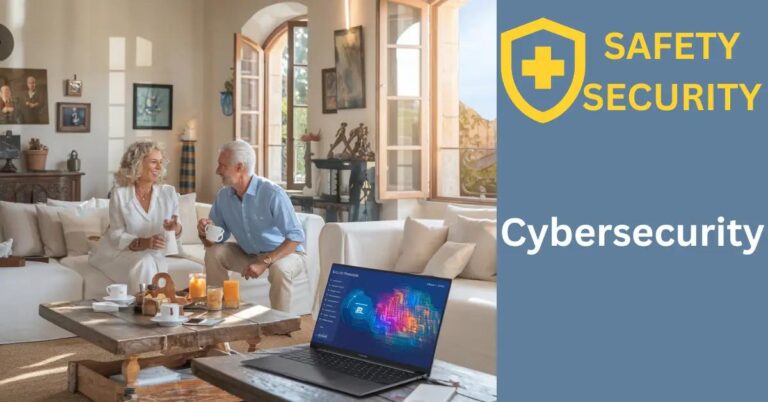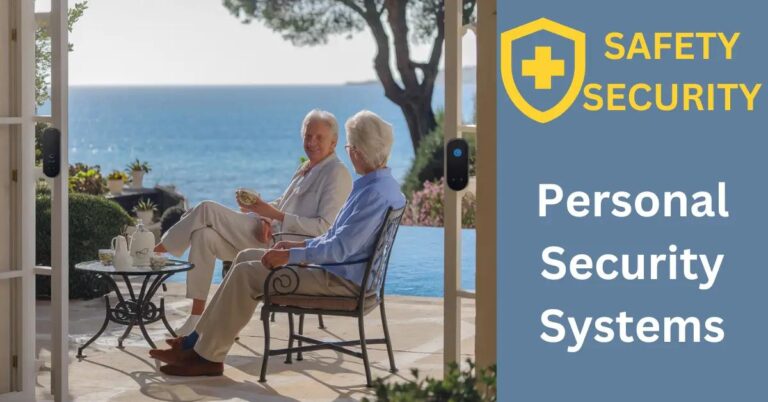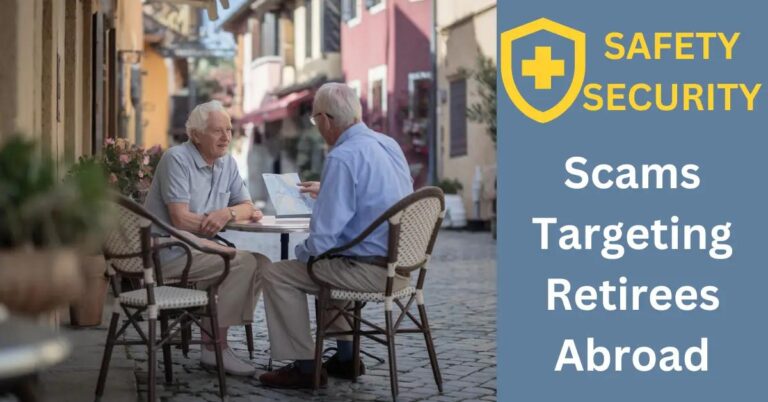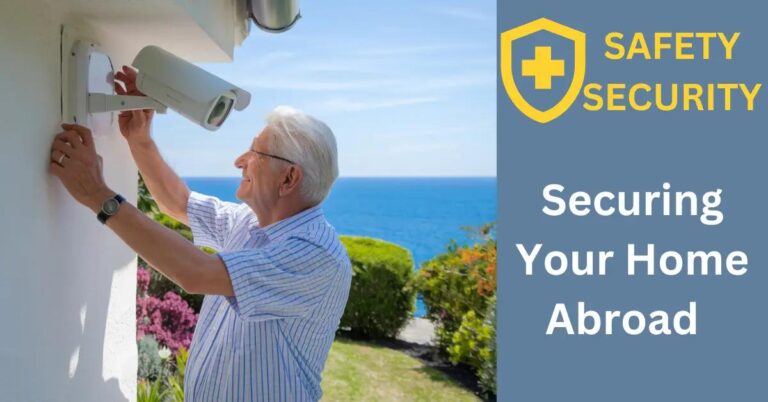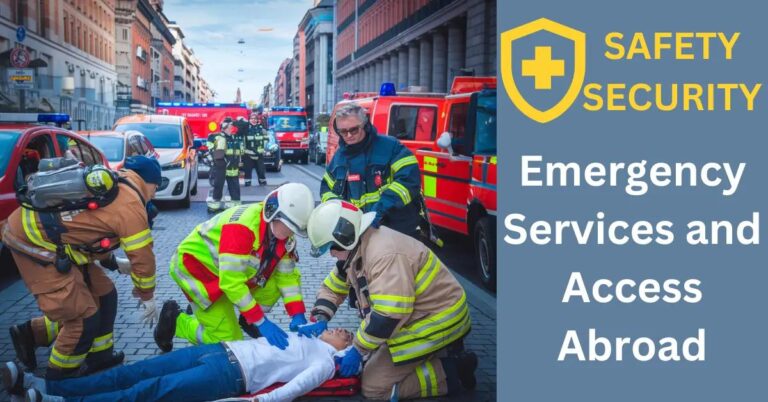TL;DR:
- Retirees abroad can utilize mobile safety apps like the Red Cross Emergency App for quick alerts and location sharing.
- Free apps like HelpAround provide basic emergency services.
- Devices such as SkyAngel offer no-cost emergency call buttons without monthly fees.
- International services like IAMAT connect retirees with global doctors. Programs such as the U.S. State Department's STEP send crisis alerts.
- Telemedicine provides remote healthcare access.
- Medicare doesn't cover emergency alert systems overseas.
- Essential safety includes familiarity with local hospitals and emergency services.
- Joining expat networks offers local advice, support, and security.
- Digital tools and community connections bolster safety for retirees overseas.
Are you a retiree living abroad or planning to become one? Let's talk safety. Emergencies can happen anywhere, and being prepared in a foreign country adds unique challenges. Figuring out the best emergency contact systems for retirees is not just smart—it's vital. From free apps that connect you to help instantly, to devices with no monthly fees, I'll guide you through the most reliable options. Keep reading to feel confident and secure, even miles from home.
How can retirees abroad effectively use technology for emergency communication?
Technology offers many tools for retirees when they face emergencies abroad. Let's look into some effective solutions. When we talk about emergency communication tools for retirees, we cover everything from apps to devices.
First, let's dive into mobile safety apps. Seniors can download apps designed for quick help, like the Red Cross Emergency App. These apps alert loved ones with one tap and share your location for a faster response. Next, choose reliable apps that won't fail when needed most. Check reviews and ratings before choosing.
Now, if you're looking for no-cost options, don't worry. Some free apps offer basic emergency services without a fee. Examples include HelpAround, which connects users with a nearby network during emergencies. Although free apps can be useful, they might not provide all features.
For an emergency call button with no monthly fees, consider devices like SkyAngel. This device connects seniors to family without extra charges and sends alerts quickly by a simple press of the button. It’s small, wearable, and easy to use.
Understanding these options empowers retirees to plan for emergencies efficiently. Each tool has its pros and cons, so assess your specific needs. In addition, learning about the region and culture can help navigate emergencies. Language barriers may also impact communication, making clear and simple tools critical.
Remember to share your plans with family and friends to ensure they know how to respond in emergencies. Communication is key, and with the right tech tools, retirees can enjoy their time abroad with peace of mind.
In summary, emergency apps and devices offer critical tools for maintaining safety. Evaluating and choosing the right technology empowers retirees to handle emergency situations effectively, thus enhancing their overall security overseas.
What international services help retirees manage emergencies?
International services play a key role in keeping retirees safe abroad. One major provider is the International Association for Medical Assistance to Travellers (IAMAT), offering medical advice and resources globally. They connect retirees with trusted doctors worldwide. Such services are crucial for peace of mind.
Governments are also stepping in to protect their citizens abroad during emergencies. For example, the U.S. State Department offers the Smart Traveler Enrollment Program (STEP), where expats can register and receive alerts. STEP also sends location-specific alerts during crises. Many countries have similar programs to ensure their citizens are safe and informed.
When evaluating global emergency contact networks, it's important to consider their responsiveness and reliability. Organizations like the Global Rescue provide on-demand 24/7 assistance for medical and security emergencies. They are equipped to assist retirees in different countries with trained experts covering various areas of need.
Does Medical Guardian work outside the US? Precision: No. Medical Guardian generally functions within U.S. borders, offering personal emergency response systems primarily at home. But retirees can carry portable devices for limited use outside. Contacting Medical Guardian can provide more specific guidance on their products internationally.
Does Medicare pay for emergency alert systems? Precision: No. Medicare does not usually cover extras like emergency alert systems for use outside the U.S. Retirees should consider purchasing these separately to enhance their safety abroad.
Selecting the best emergency contact system for retirees abroad depends on personal needs and services offered. Companies like Lifeline and Alert1 offer devices designed for international use. They focus on simple interfaces and immediate connection to help.
With the right safety systems and knowledge, retirees can focus on enjoying their time abroad while being well-prepared for unexpected situations. Reliable international services, responsible government programs, and personal alert systems all contribute to safety. Choose these wisely to ensure peace of mind.
How to Prepare for Health-Related Emergencies While Retiring Abroad
When living far from home, health emergencies can surprise retirees. To stay safe, we need reliable medical alert systems. These systems keep us connected and ready who to call, even in countries where we don’t speak the language.
A medical alert system is a lifeline for many of us. It often has a button to call for help. But what is the best emergency button for retirees? Precision tells us that a mobile-friendly button is best. It allows us to reach help anytime, anywhere. Some systems even let us call cell phones directly. This is important if we stay in multiple places.
Telemedicine is another vital tool for our health abroad. It lets us talk to doctors anywhere. We can get quick advice from professionals without leaving our homes. Internationally, telemedicine saves us time and can speed up treatment during a crisis. It's like having a doctor in our pocket.
Now, let's talk about creating an emergency plan. A good plan includes knowing local emergency numbers. Also, keep track of nearby hospitals and clinics. We should understand how local health systems function and respond to emergencies. Any delays in care could risk our health when minutes matter.
Regarding cost, many ask, "How much does Life Alert really cost?" Precision provides that the investment varies. Monthly fees can range from $50 to $90. While this may seem high, think about Life Alert's benefits. It offers immediate help, with no need to fumble for a phone. It also works beyond the US, which is ideal for retirees abroad.
Choosing the right system is important for life overseas. Look for features like mobile access, multilingual support, and easy maintenance. The right alert system and planning ensure we remain safe, comfortable, and free to enjoy retirement without constant worry about our health.
How Can Retirees Ensure Their Safety and Security Overseas?
When moving abroad, retirees need strong security systems. One key part of this is building effective expatriate senior security systems. These systems include access to local emergency contacts and reliable health services. Every retiree should know their nearest embassy or consulate, as they offer guidance in emergencies.
Retiree relocation comes with unique safety tips. Investigate healthcare quality and availability in your new country. Secure international health insurance to cover unexpected medical costs. Also, stay updated on local laws to avoid trouble.
Safety during travel is vital for seniors abroad. Always share travel plans and contacts with family members. Secure copies of important documents like passports and medical records. Keep emergency numbers ready in your phone or wallet. This ensures help is accessible in unexpected situations.
Incorporating family into your expat emergency plans is important. Families act as a lifeline in emergencies, providing support or caregiving. Make sure they know your healthcare needs and preferences. Discuss how you want emergencies handled and ensure they have copies of your emergency contacts and addresses. Coordinating with them increases response speed during critical events.
Emergency planning is a must for senior retirees. Start by creating a detailed emergency plan. Clearly identify hospital locations, emergency procedures, and contacts. Develop a "go-bag" with medications, documents, and personal necessities. Local authorities and expat communities offer additional resources—sometimes even online guides—for emergency preparedness. Planning now ensures you can manage any problem effectively.
Understand that relocating abroad means taking proactive steps for safety and security. As a retiree, adapting to new living conditions and embracing safety measures is crucial for peace of mind. Engaging with support services and involving family integrates seamlessly into your expat lifestyle, ensuring you enjoy this new chapter without worry.
How Can Retirees Leverage Technology and Community Networks for Safety?
Retirees living abroad can use technology to boost their safety. Digital tools like emergency apps make a big difference. For example, GPS-enabled apps can track your location. This is crucial if you get lost or face danger. Many apps also offer quick access to local emergency services.
Expat community support services play a fundamental role, too. They provide a network of fellow retirees who understand your needs. Groups often share tips and offer guidance for emergency situations. Being part of these networks ensures you have a support system nearby.
Networking strategies provide much-needed reassurance. Knowing you're connected with others reduces stress. Expat networks often host events and workshops. These activities teach skills for emergency preparedness. Building friendships through these networks strengthens social ties. This enhances your sense of security.
Leveraging expat networks during emergencies helps greatly. These communities often have experience with local challenges. They can offer solutions and support when emergencies arise. Whether it's sharing a trusted doctor’s number or offering a place to stay, having people you trust gives peace of mind.
In terms of technology, you should explore digital tools for safety. For instance, carrying a smartphone with reliable apps ensures quick help is reachable. Always keep digital copies of important documents, like your passport. They can be life-saving if the originals get lost or stolen.
Proactive networking strategies enhance safety. Join local clubs and online forums that connect expats. These platforms allow you to share and receive information swiftly. Networking helps familiarize yourself with local resources and services.
Finally, securing reassurance overseas involves more than planning. It’s about building relationships and learning to use technology effectively. Together, these elements create a comprehensive safety net. Retirees can live more confidently by working with their communities and using digital tools. If this resonates, consider joining an expat network near you. They’re just a click away.
Conclusion
Using technology, retirees can safeguard themselves abroad in emergencies. We've explored mobile safety apps, international response services, and reliable contact systems. Choose tools with no monthly fees and leverage expat community networks. Remember, a robust emergency plan is key to overseas safety. Incorporate these solutions to ensure you're prepared and secure, wherever you are.


